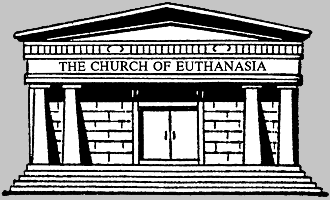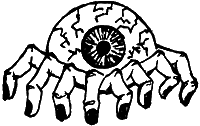
|
| Church of Euthanasia |
The One Commandment: "Thou shalt not procreate" The Four Pillars: suicide · abortion cannibalism · sodomy |
|
SAVE THE PLANET KILL YOURSELF |
|
news ·
resources ·
e-sermons ·
snuff it ·
family album music · video · catalog · faq · press · links · contact |
|||
Recomended Reading1984, by George Orwell. The ultimate Dystopia bears an uncanny resemblance to the United States, though of course coercion is now largely unnecessary, due to the overwhelming acceptance of television. Even if you read it in high school, it's worth reading again; follow it up by watching Brazil. All's Quiet on the Western Front, by Erich Maria Remarque, is "neither an accusation nor a confession, and least of all an adventure, for death is not an adventure for those who stand face to face with it. It [tries] simply to tell of a generation of men who, even though they may have escaped its shells, were destroyed by war." Follow this one up by watching Paths of Glory, Stanley Kubrick's wrenching film about the W.W.I troop mutinies. Yes, the French generals really did give orders to fire on their own troops. Biodiversity, by E.O.Wilson. Even by conservative estimates, we have already lost one-third of the species on this planet, but the good news is that if anything survives, ants will. Wilson likes ants, and argues convincingly that they are the best-adapted social creatures on Earth. Long live the ants. Breakfast of Champions, by Kurt Vonnegut. Any novel about a dying planet in which the male characters are introduced by their penis size is okay by us. The illustrations are priceless, and the book is worth reading for the first chapter alone, in which Vonnegut describes the "discovery" of America: "The chief weapon of the sea pirates...was their capacity to astonish. Nobody else could believe, until it was much too late, how heartless and greedy they were." The Decade of Destruction, by Adrian Cowell. An astonishing first-hand description of the heroic but doomed efforts to save the Amazon natives from approaching "civilization," during the mammoth Brazilian development projects of the 60's and 70's. Many had never seen another tribe, let alone a white person, and the conversations with them are like messages from another planet. Cowell hits home when he says that "the difference between the Indian and the civilizado...is the chasm between the man who lives in the forest and the man who lives in civilization--the system of the city." Cowell also writes about his personal friendship with labor leader Chico Mendes, who was later assassinated by the UDR (the rancher's party). Entropy: Into the Greenhouse World, by Jeremy Rifkin, the revised 1989 edition. This is one of the most shocking books we've encountered; it turns the "Age of Progress" completely upside-down, with incredible force and precision, and concludes that "The only hope for the survival of the species is for the human race to abandon its aggression against the planet and seek to accommodate itself to the natural order." Amen. Rifkin grimly applies the second law of thermodynamics to every aspect of the modern world, and demonstrates that life is negative entropy. After reading this, you'll understand our slogan "Efficiency = Death." Final Exit, by Derek Humphry. The founder of the Hemlock Society gives us a handy, compassionate, and very practical how-to guide that covers a variety of "self-deliverance" methods, as well as legal issues such as "living wills." He includes drug dosages, and it's even set in oversized type for the older folks. If you can't find it anywhere else, you can order it directly from Hemlock (see contacts). Have a well-considered death. Gravity's Rainbow, by Thomas Pynchon. There's really no way to describe this novel; let's just say it's worth the considerable effort. Some of its numerous characters also appear in V. (his first book), and even though it's (mostly) set later, you might want to start with V. just because it's shorter. If you decide to tackle Gravity's Rainbow, we've compiled an index which will make it somewhat easier to follow; we'll be happy to send you a copy. If you get to the end, you'll also enjoy The Crime and Punishment of I.G. Farben by Joseph Borkin, which subtantiates many of the historical details. A Guide for the Perplexed, by E.F.Schumacher. A very thorough if somewhat tedious explanation of the Four Levels of Being. Like all Christian theology, it can be (and is) easily misunderstood; in the wrong hands it leads directly to humanism and the elitist notion that we are superior beings. Know your enemy. Howl, by Allen Ginsberg, our sacred poet and the world's greatest living sodomite. Part III invokes the Ammonite god who eats his children; strap on your skull mask and "howl" it to a captive crowd for instant DADA. The Jungle, by Upton Sinclair. A classic, perhaps overly melodramatic, but still gripping account of the Chicago meat-packing industry around the turn of the century. This book contains the oldest reference we've found to the Octopus (the second oldest is in Gravity's Rainbow). The Lorax, by Dr. Seuss. Yes, it's a children's book. Get over it. The Lorax speaks for the trees. Manufacturing Consent: The Political Economy of the Mass Media, by Edward S. Herman and Noam Chomsky. If this book doesn't cure you of reading newspapers, we don't know what will. The Notebooks of Malte Laurids Brigge, by Rainer Maria Rilke. An anecdotal, obsessive journey into private and public hell. The descriptions of turn-of-the century Paris are frighteningly familiar; the characters are vivid and haunting. A People's History of the United States, by Howard Zinn. This is the best alternative history of the U.S. we've seen; it's comprehensive, accurate, and readable. The first chapter on Columbus should be required reading in every school. You will feel ashamed (and lied to), or your money back. Americans must die to save the planet. Our Plundered Planet, by Fairfield Osborn. Who better to describe Humans objectively than the president of the New York Zoological Society? This book might be hard to find, but it's a real gem. Our copy's dust-jacket includes glowing recommendations from Aldous Huxley and Eleanor Roosevelt, and says that "no nation in the long history of civilization has been more violently destructive of its life-supporting resources than the United States of America--that 'country of the great illusion,' the country that can 'feed the world.'" Remember, this was in 1948! The Population Explosion, by Paul Erlich. If you're reading Snuff It, this book is probably "preaching to the choir," but if you have any nagging doubts, it's all in there. Written ten years earlier, The Population Bomb is shorter, less resigned, more passionate, and very quotable. Needless to say, the "bomb" went off. Secret and Suppressed: Banned Ideas and Hidden History, edited by Jim
Keith, attempts "to create doors...where once there were walls."
How can the media be both free and controlled at the same time, and why?
The questions are pure subversion, and the answers are terrifying.
Electromagnetic weapons. Remote mind control. J.F.K.'s assassination as
a Freemason "Killing of the King" ritual.
The Sixteen Satires, by Juvenal, translated by Peter Green. It's amazing how little urban life has changed since ancient Rome. Folks pushed paper all day, worked out at the gym, dined at restaurants, read about scandals, and longed for holidays. The satire is vicious, perverted, and utterly hilarious; all roads lead to sodomy. Satire IX features an aging gigolo: "Do you suppose it's easy, or fun, this job of cramming my cock up into your guts till I'm stopped by last night's supper?" Tales of Power, by Carlos Castenada. "Only if one loves this earth with unbending passion can one release one's sadness," Don Juan said. "A warrior is always joyful because his love is unalterable and his beloved, the earth, embraces him and bestows upon him inconceivable gifts...sadness belongs only to those who hate the very thing that shelters their beings." The Tarot, by Paul Foster Case, founder of The Builders of the Adytum (BOTA). An excellent overview of the history and construction of the esoteric Tarot and the Qabalah, including exquisite renditions of the Major Arcana by Jessie Burns Parke. A chapter is devoted to each Trump, and the errors of the popular "Rider" pack are explained, and corrected. BOTA distributes Parke's deck, in black-and-white only; they recommend you color it in (using their detailed instructions) while studying the book, thereby personalizing the cards and imprinting them on your subconscious. We did this, and are well-pleased with the results. The Technological Society, by Jacques Ellul. The grandfather of the Situationists dissects technique, with "monumental calm and maddening thoroughness." Rifkin's Entropy is cheerful by comparison; abandon all hope, ye who enter here. If you finish it without killing yourself, check out Propaganda: The Formation of Men's Attitudes, in which Ellul reveals that "The fundamental myths of our society...are Work, Progress, and Happiness," and that "successful propaganda will occupy every moment of the individual's life." Theosophy: An Introduction to the Supersensible Knowledge of the World and the Destination of Man. by Rudolph Steiner. This extremely formal and typically German book on the "occult science" of Goethe covers more or less the same ground as A Guide for the Perplexed, though with much longer sentences and a much higher boggle factor; the chapter on "Spiritland" is way out there. Steiner later went on to found the Waldorf schools, among other things. Worlds in Harmony: Dialogues on Compassionate Action, by the Dalai Lama. A long line of people ask interesting questions, and His Holiness answers them, with wisdom and compassion. Our favorite answer? "I think that our basic nature as human beings is to be vegetarian--making every effort not to harm other living beings." Zen and the Art of Motorcycle Maintenance, by Robert Pirsig. Pirsig combines an incredibly moving personal story with a rhetorically flawless refutation of Western philosophy all the way back to Socrates. More pertinent now than ever, this is one of those books that just keeps getting better. Highly Recommended. |


 Jim Jones, Waco, the Vatican, even a draft of Danny Casolaro's
Octopus manuscript proposal! We checked on the subliminal images in Oliver
Stone's J.F.K. and they're in there alright. This one wins Highest Boggle
Factor Ever. Follow it with Apocalypse Culture, edited by Adam
Parfrey; highlights include John Zerzan's The Case Against Art,
which could easily have inspired the Unabomber's manifesto.
Jim Jones, Waco, the Vatican, even a draft of Danny Casolaro's
Octopus manuscript proposal! We checked on the subliminal images in Oliver
Stone's J.F.K. and they're in there alright. This one wins Highest Boggle
Factor Ever. Follow it with Apocalypse Culture, edited by Adam
Parfrey; highlights include John Zerzan's The Case Against Art,
which could easily have inspired the Unabomber's manifesto.